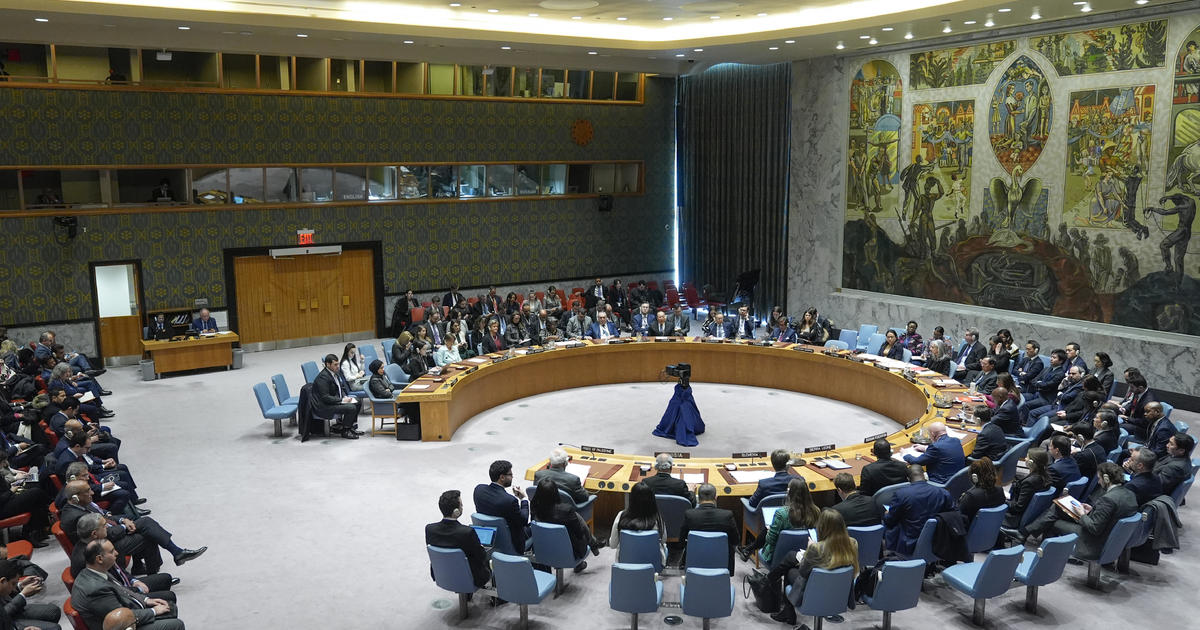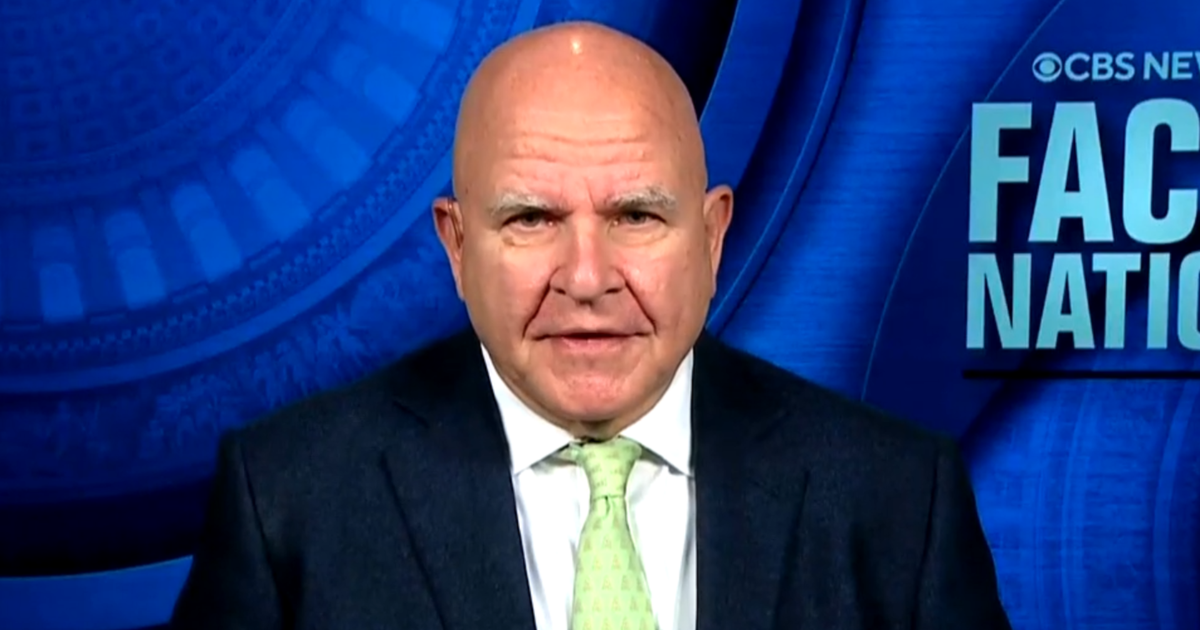CBS News
U.S. vetoes United Nations resolution calling for immediate humanitarian cease-fire in Gaza

The United States on Tuesday vetoed an Arab-backed and widely supported U.N. resolution demanding an immediate humanitarian cease-fire in the Israel-Hamas war in the embattled Gaza Strip, saying it would interfere with negotiations on a deal to free hostages abducted in Israel.
The vote in the 15-member Security Council was 13-1 with the United Kingdom abstaining, reflecting the strong support from countries around the globe for ending the more than four-month war, which started when Hamas militants invaded southern Israel, killing about 1,200 people and taking 250 others hostage. Since then, more than 29,000 Palestinians have been killed in Israel’s military offensive, according to the Gaza Health Ministry, which says the vast majority were women and children.
It was the third U.S. veto of a Security Council resolution demanding a cease-fire in Gaza and came a day after the United States circulated a rival resolution that would support a temporary cease-fire in Gaza linked to the release of all hostages and call for the lifting of all restrictions on the delivery of humanitarian aid.
Virtually every council member — including the United States — expressed serious concern at the impending catastrophe in Gaza’s southern city of Rafah, where some 1.5 million Palestinians have sought refuge, if Israeli Prime Minister Benjamin Netanyahu goes ahead with his plan to evacuate civilians from the city and move Israel’s military offensive to the area bordering Egypt, where Israel says Hamas fighters are hiding.
Seth Wenig / AP
Before the vote, Algeria’s U.N. Ambassador Amar Bendjama, the Arab representative on the council, said: “This resolution stands for truth and humanity standing against the advocates for murder and hatred.”
“A vote in favor of this draft resolution is a support to the Palestinians right to life,” he said. “Conversely, voting against it implies an endorsement of the brutal violence and collective punishment inflicted against them.”
U.S. Ambassador Linda Thomas-Greenfield said the United States understands the council’s desire for urgent action but believes the resolution would “negatively impact” sensitive negotiations on a hostage deal and pause in fighting for at least six weeks. If that happens, “we can take the time to build a more enduring peace,” she said.
The proposed U.S. resolution, Thomas-Greenfield said, “would do what this text does not — pressure Hamas to take the hostage deal that is on the table and help secure a pause that allows humanitarian assistance to reach Palestinian civilians in desperate need.”
Seth Wenig / AP
What happens next remains to be seen.
The 22-nation Arab Group could take its resolution to the U.N. General Assembly, which includes all 193 U.N. member nations, where it is virtually certain to be approved. But unlike Security Council resolutions, assembly resolutions are not legally binding.
Thomas-Greenfield told the council the United States “will work in earnest in negotiating” on its proposed resolution, leaving time for all council members to comment, “rather than impose an arbitrary deadline for the vote.”
The defeated Arab-backed resolution would have demanded an immediate humanitarian cease-fire to be respected by all parties, which implies an end to the war.
By contrast, the U.S. draft resolution would underscore the Security Council’s support for a temporary cease-fire “as soon as practicable, based on the formula of all hostages being released,” and call for “lifting all barriers to the provision of humanitarian assistance at scale.”
It is the first time the U.S. has used the word “cease-fire,” as opposed to cessation of hostilities.
Seth Wenig / AP
The Arab draft would also have demanded the immediate release of all hostages, rejected the forced displacement of Palestinian civilians, called for unhindered humanitarian access throughout Gaza, and reiterated council demands that Israel and Hamas “scrupulously comply” with international law, especially the protection of civilians.
Without naming either party, it would have condemned “all acts of terrorism” and reiterated the council’s “unwavering commitment” to a two-state solution with two democratic states, Israel and Palestine, living side-by-side in peace.
In measures sure to anger Israel — and reinforce differences and tensions between U.S. President Joe Biden and Israel’s Netanyahu — the U.S. draft resolution reiterates the same unwavering commitment to a two-state solution, which the Israeli leader opposes.
Biden has repeatedly called on Israel to protect Palestinian civilians, and the draft resolution says Israel’s planned major ground offensive in Rafah “should not proceed under current circumstances.”
And it warns that further displacement of civilians, “including potentially into neighboring countries,” a reference to Egypt, would have serious implications for regional peace and security.
Seth Wenig / AP
In another criticism directed at Israel, the U.S. draft “condemns calls by government ministers for the resettlement of Gaza and rejects an attempt at demographic or territorial change in Gaza that would violate international law.”
While this was the third U.S. veto of a Security Council resolution demanding an immediate cease-fire, the council has adopted two resolutions on Gaza where the U.S. abstained.
Its first resolution, on Nov. 15, called for “urgent and extended humanitarian pauses” in Gaza to address the escalating crisis for Palestinian civilians during Israel’s aerial and ground attacks.
On Dec. 22, the council adopted a watered-down resolution calling for immediately speeding aid deliveries to hungry and desperate civilians in Gaza, but without the original plea for an “urgent suspension of hostilities” between Israel and Hamas.
It did call for “creating the conditions for a sustainable cessation of hostilities.” The steps are not defined, but diplomats said it was the council’s first reference to stopping fighting.
CBS News
Former Trump national security adviser says next couple months are “really critical” for Ukraine

Washington — Lt. Gen. H.R. McMaster, a former national security adviser to Donald Trump, said Sunday that the upcoming months will be “really critical” in determining the “next phase” of the war in Ukraine as the president-elect is expected to work to force a negotiated settlement when he enters office.
McMaster, a CBS News contributor, said on “Face the Nation with Margaret Brennan” that Russia and Ukraine are both incentivized to make “as many gains on the battlefield as they can before the new Trump administration comes in” as the two countries seek leverage in negotiations.
With an eye toward strengthening Ukraine’s standing before President-elect Donald Trump returns to office in the new year, the Biden administration agreed in recent days to provide anti-personnel land mines for use, while lifting restrictions on Ukraine’s use of U.S.-made longer range missiles to strike within Russian territory. The moves come as Ukraine marked more than 1,000 days since Russia’s invasion in February 2022.
Meanwhile, many of Trump’s key selection for top posts in his administration — Rep. Mike Waltz for national security adviser and Sens. Marco Rubio for secretary of state and JD Vance for Vice President — haven’t been supportive of providing continued assistance to Ukraine, or have advocated for a negotiated end to the war.
CBS News
McMaster said the dynamic is “a real problem” and delivers a “psychological blow to the Ukrainians.”
“Ukrainians are struggling to generate the manpower that they need and to sustain their defensive efforts, and it’s important that they get the weapons they need and the training that they need, but also they have to have the confidence that they can prevail,” he said. “And any sort of messages that we might reduce our aid are quite damaging to them from a moral perspective.”
McMaster said he’s hopeful that Trump’s picks, and the president-elect himself, will “begin to see the quite obvious connections between the war in Ukraine and this axis of aggressors that are doing everything they can to tear down the existing international order.” He cited the North Korean soldiers fighting on European soil in the first major war in Europe since World War II, the efforts China is taking to “sustain Russia’s war-making machine,” and the drones and missiles Iran has provided as part of the broader picture.
“So I think what’s happened is so many people have taken such a myopic view of Ukraine, and they’ve misunderstood Putin’s intentions and how consequential the war is to our interests across the world,” McMaster said.
On Trump’s selections for top national security and defense posts, McMaster stressed the importance of the Senate’s advice and consent role in making sure “the best people are in those positions.”
McMaster outlined that based on his experience, Trump listens to advice and learns from those around him. And he argued that the nominees for director of national intelligence and defense secretary should be asked key questions like how they will “reconcile peace through strength,” and what they think “motivates, drives and constrains” Russian President Vladimir Putin.
Trump has tapped former Rep. Tulsi Gabbard to be director of national intelligence, who has been criticized for her views on Russia and other U.S. adversaries. McMaster said Sunday that Gabbard has a “fundamental misunderstanding” about what motivates Putin.
More broadly, McMaster said he “can’t understand” the Republicans who “tend to parrot Vladimir Putin’s talking points,” saying “they’ve got to disabuse themselves of this strange affection for Vladimir Putin.”
Meanwhile, when asked about Trump’s recent selection of Sebastian Gorka as senior director for counterterrorism and deputy assistant to the president, McMaster said he doesn’t think Gorka is a good person to advise the president-elect on national security. But he noted that “the president, others who are working with him, will probably determine that pretty quickly.”
CBS News
Sen. Van Hollen says Biden is “not fully complying with American law” on Israeli arms shipments

Watch CBS News
Be the first to know
Get browser notifications for breaking news, live events, and exclusive reporting.
CBS News
Rep.-elect Sarah McBride says “I didn’t run” for Congrees “to talk about what bathroom I use”

Watch CBS News
Be the first to know
Get browser notifications for breaking news, live events, and exclusive reporting.












